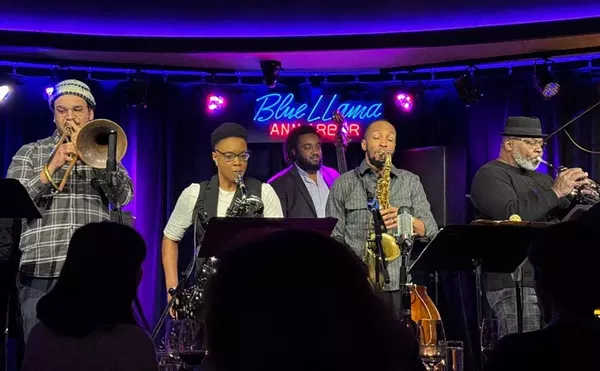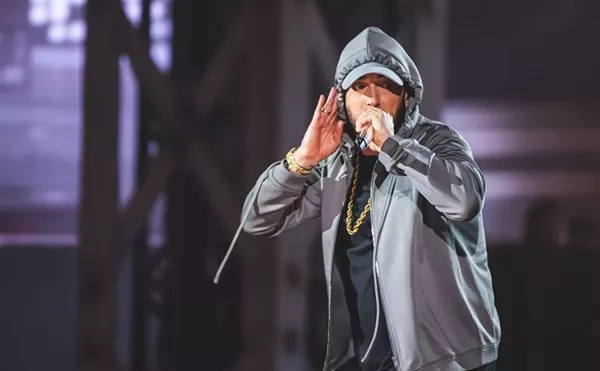Twenty years ago, Mamadou Konte, a Senegalese living in Paris, created an event that would spread Africa's cultural riches to the rest of the world; a music and arts festival called Africa Fete. Today, Konte and his festival bring a bit of the best of Africa to more than 600 concerts annually on three continents.
From 1993 to 1995, Africa Fete made a few stops in North America, bringing some of the biggest African artists to major U.S. cities. Consequently, it faced three years of financial problems caused by the high costs of bringing huge ensembles across vast distances.
This year, the Fete has been reinvigorated, due in large part to a $2 million grant from the Kennedy Center and American Express. Happily, Detroit is one of more than a dozen cities taking part in this "Afripalooza." On Thursday, Papa Wemba (who hails from Congo), Cheikh Lo (from Senegal), Maryam Mursal (a Somalian) and Salif Keita (from Mali) will headline an enormous spectacle encompassing music, arts and many other aspects of African culture at Detroit's Orchestra Hall.
In late 1996 and early 1997, I took a musical voyage across the Atlantic to produce a series of radio programs focusing on the legends of Afropop. That trip, as it turned out, was a preview of this year's Africa Fete.
My first stop was Paris, the musical capital and crossroads of Europe, home to more than a hundred record companies and many renowned stars from all over the world. For decades, musicians from across Africa have traveled to Paris to record in the modern studios and promote their work on the world stage. World music giants such as Khaled, Manu Dibango, Toure Kunda, Angelique Kidjo and Cheb Mami are just a few among a huge list of musicians now based there.
After passing through customs and skipping the typical tourist destinations, I was off to a predominantly African neighborhood just north of the city to meet legendary Mandingo singer Salif Keita. After a long series of introductions to his extended family, Keita and I began talking music. I was surprised to find that Keita, an African albino, legendary for his powerful voice and energetic concerts, spoke barely above a whisper. Over the next hour, he told me of his unusual musical journey.
Keita family roots reach back to the 13th century King Sundiata Keita of the Malian empire. "My family didn't want me to go into music. They wanted me to do something 'respectable,' like study business." As a teenager, Keita sneaked away from home to rehearse with his friends, finally deciding to run away. He first joined the Rail Band, that played, of course, in the Malian city of Bamako's train station. Later he formed the group "Les Ambassadeurs," composed film scores and launched a solo career that has taken him around the world. Today the name Keita is part of world music's royalty.
My next stop was another Paris suburb, to visit with Congolese superstar Papa Wemba. Like many African artists, Papa Wemba has two bands; one for African audiences and another for "the international market." In both ensembles, he shows a remarkable vocal range, with his soaring voice alternating between lyrics in Lingala, Swahili and, occasionally, French.
For nearly three decades, Wemba has been at the center of the Congolese music scene, creating rhythms that can be heard in clubs and radio stations throughout the entire continent(!) Over the years, his bands have included the now-legendary soukous dance group Zaiko Langa Langa, as well as Viva La Musica and his current touring ensemble Molokai. His trademark is integrating the traditional songs of his home in the Baluba region of Congo with an Afro-Cuban rumba beat.
Wemba detailed his frustrations with the international music industry: "On one hand, it is great to be able to perform here in Europe and other parts of the world, but I don't like the compromises that we often have to make."
These compromises involved the "Westernizing" of African music, adding keyboards and other instruments that he would have never played back in Africa. "Still, it is a wonderful opportunity to share our culture with the rest of the world," Wemba said
From Paris I headed to West Africa for two weeks in Mali and Senegal. Wherever I went, I was always asked, "What are you doing here?" Apparently, most Caucasians there were traveling on business for multinational corporations. North American music reporters studying African music were rare. Throughout the trip, I was invited to meet dozens of musicians, including a young Senegalese guitarist named Cheikh Lo.
In his Dakar home, Lo greeted me in a white African robe, a contrast from his stunning dreadlocks, which, he explained, were a facet of his faith, Mbaye Fall, a deeply spiritual sect of Islam. Cheikh Lo, a protege of Youssou N'Dour, is one of the hottest guitarists -- in both playing and audience reception -- in West Africa. His music is a rootsy Mbalax, the trademark sound of Dakar, mixing local Wolof traditions with pop, reggae, salsa and funk.
In the early '90s, Lo explained, he traveled to France, following in the footsteps of many Afropop stars. "What I encountered were lots of posters of the fascist (Jean-Marie) Le Pen and his strong anti-immigrant campaign." Lo stayed several years in France, achieving only moderate success as an Afropop session musician. After returning to Senegal, though, he recorded his first record of his own material, Ne La Thiass. No keyboards, no synthesizers; just an Mbalax sound rarely heard outside of Senegal.
I asked Lo about one of his songs, "Doxandeme," which deals with some of the hypocrisies in French immigration policies. In response, he then picked up his acoustic guitar, began strumming and explained, "When I saw all of those Le Pen posters, I thought 'I'll make a deal with Le Pen.' Come and visit us in Senegal. We welcome everyone. Come here, see how we treat you and then make your laws."
This week, fans of African music won't have to travel thousands of miles to experience the spectrum of music from the African continent as Africa Fete makes its Detroit premiere. Joining Cheikh Lo, Papa Wemba and Salif Keita is Maryam Mursal, one of the leading voices of Somali music.
Mursal, now living in Denmark, escaped Mogadishu at the height of the Somali civil war. She walked, crawled and rode on donkeys and trucks with her five children for seven months before reaching safety. Her music, as evidenced on her recent release, The Journey, inspired by her incredible escape, is a mix of Arabic and East African music, taking traditional Somali folk songs and adding to them a massive pop mix.
When the artists performing during Africa Fête take the stage, know that there's a tale behind every tune. And, far from the desperate images that come to us via the evening news, every one is a celebration of life. Yes, Africa Fete is a massive undertaking. Four bands representing the best in contemporary African music, an African marketplace complete with arts, crafts and food. It will be the biggest night for African music in Detroit this decade. But it's much, much more. Dan Roseberg writes frequently about music for the Metro Times. E-mail [email protected]






